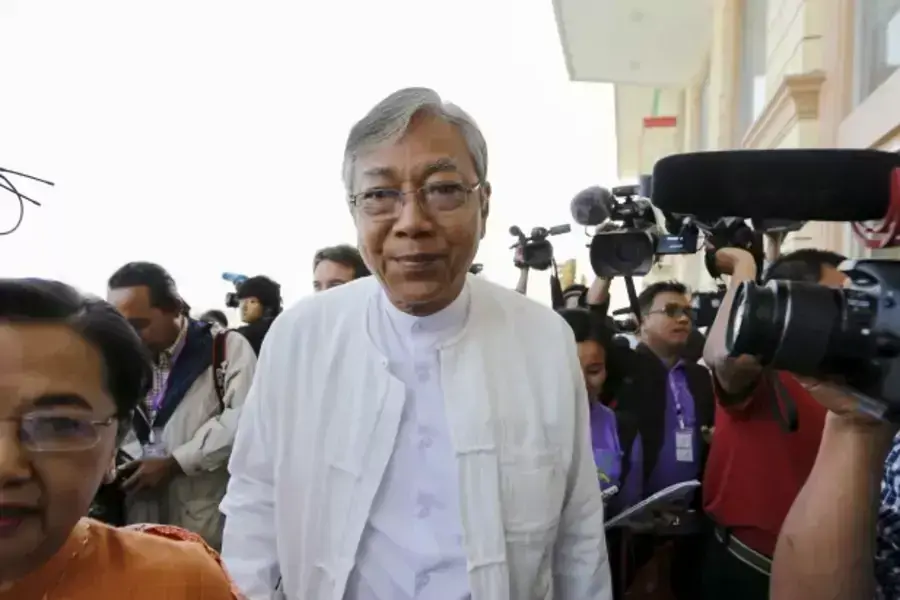More on:
Htin Kyaw, who is almost surely going to be the new president of Myanmar, was so unknown to the international media that when he was nominated last week for president by the National League for Democracy (NLD), stories about him were riddled with mistakes. Some news reports suggested that he had attended Oxford University (his father actually attended Oxford, while Htin Kyaw studied at the defunct University of London Institute of Computer Science), while other reports suggested he had been Suu Kyi’s chauffeur, a rumor strenuously denied by NLD spokespeople.
The Irrawaddy’s Aung Zaw offers a more thorough profile of Htin Kyaw, a longtime NLD member. Aung Zaw notes that Htin Kyaw is regarded by many associates as disciplined, capable of communicating well with both domestic and international audiences, and highly organized. Since the NLD dominates the powerful lower house of parliament, Htin Kyaw is almost sure to be confirmed as president. (Myanmar’s president is not chosen by direct election; the upper house and the military also nominated presidential candidates, but Htin Kyaw is almost certain to be selected.)
Despite Htin Kyaw’s positive traits, his most important qualification for the job is his lifelong, unalloyed commitment to Aung San Suu Kyi, who is constitutionally barred from serving as president. Even before the November 2015 election, Suu Kyi made clear that, if the NLD won, she intended to govern the country by proxy, and she has not shied away from that stance. Htin Kyaw certainly has demonstrated his fealty to Suu Kyi and to the party, serving on the executive committee of the foundation named after her late mother. He has known Suu Kyi since childhood, and he is the son-in-law of U Lwin, who was a co-founder of the National League for Democracy.
Larry Jagan, one of the most experienced reporters on Myanmar, offered this analysis of what the relationship between Suu Kyi and a President Htin Kyaw might look like:
The iconic pro-democracy leader is set to become ‘senior minister’ in the cabinet---along the lines of Singapore’s former prime minister, Lee Kwan Yew after he officially retired from the top post, according to senior sources in the NLD. The new position will possibly be within the president’s office, where she will effectively run the government, or as head of a new ministry to oversee the transition [to democracy.]
Although Suu Kyi and other party leaders appear to be assuming that Htin Kyaw will be a perfect proxy, doing whatever a small circle of other NLD elites want, such an assumption may be short-sighted. Once inaugurated, Htin Kyaw will, constitutionally, have a significant array of powers that he could wield even without Suu Kyi’s support. He will have the opportunity, if he wants, to build his own power base and team of advisors. Even if Suu Kyi stands firmly behind him, Htin Kyaw also will have to play a major role, himself, in ongoing and difficult negotiations between the government and ethnic insurgent groups over the possibility of a nationwide peace deal, and between the NLD and the military over reducing the army’s influence in politics. The new president has little experience dealing with the ethnic insurgencies or the military’s top commanders, and may leave his own imprint on both of these delicate negotiations.
The country’s recent history offers more lessons that the NLD’s leadership would be wise to heed. In recent years, other powerful leaders in Myanmar also mistakenly assumed their proxies would carry out their intentions unquestioningly. When Myanmar began its transition from junta role in the early 2010s, the junta’s leaders apparently believed that Thein Sein, the man they chose to manage the change, would be a perfect servant of the military. Yet soon after assuming the presidency in 2011, Thein Sein embarked upon a wave of reforms that , in many ways, appeared more ambitious and rapid than the former junta leaders had imagined. The reforms quickly won popular support, making the transition almost impossible to reverse.
More on:
 Online Store
Online Store

